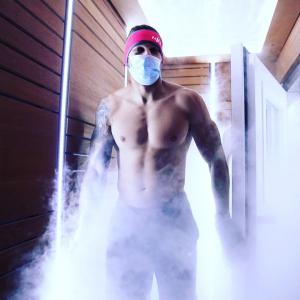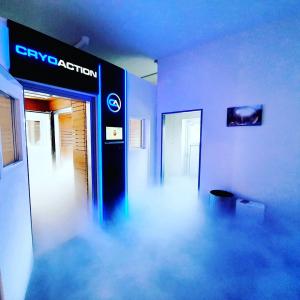Only 21% gyms offer recovery sessions and equipment. Sports massage, physiotherapy, and yoga are the most common provided.
Despite the UK’s rising appetite for recovery, fitness centres seem to be lagging in offering recovery methods, meaning they are missing out on additional revenue and even increasing their membership”
LONDON, UNITED KINGDOM, January 12, 2022 /EINPresswire.com/ -- As gyms, studios and sports facilities face serious pressures to retain and attract customers, research reveals they are missing a trick, and all-important revenue, when it comes to their inventory and equipment offering.— Ian Saunders CEO of CryoAction
With a growing emphasis on maintaining a healthy lifestyle to combat the threat of Coronavirus, research published in the Everyday Elite Report from CryoAction, which looks at the growing health and fitness habits of the average Briton, found just one in five (21%) sports and fitness facilities are offering specific options for physical and mental recovery.
The research by the UK's leading provider of whole-body cryotherapy, into the fitness and recovery habits of Britons found that 40% of people took part in some form of activity to aid their recovery from sport or exercise. With recovery techniques proven to aid performance, this means that the remaining 60% risk injury, missing out on personal bests, the opportunity to perform at the highest level, or be as active as they would like.
Sports facilities that do offer recovery sessions and equipment are most likely to offer sports massage or physiotherapy, 30.3%. With more than a quarter (28.2%) of gyms and fitness centres also offering advice on recovery by staff or resident personal trainers.
Following its resurgence, yoga was also offered at more than one in four (26.1%) sports and fitness venues, while 19% offer meditation classes. Sports facilities are also diversifying and creating further revenue streams in an attempt to bolster revenues, with a fifth of venues offering recovery products, such as nutritional supplements, supports and tape, and anti- inflammatory medicines or gels.
Interestingly, only one in 20 (5.6%) fitness centers and gyms provide access to a cryochamber despite increased uptake in use among professional sports clubs and celebrities.
Ian Saunders, CEO of CryoAction, said: “Gyms and the wider fitness industry have been hit hard by the coronavirus pandemic, and they face the challenge of trying to regain the trust and interest in fitness from the public. In the post-pandemic world, fitness venues need to take every opportunity they can to attract and retain customers and diversify their revenue streams by offering new and alternative facilities and equipment.
“Despite the UK’s rising appetite for recovery, gyms and fitness centres seem to be lagging in offering recovery methods and equipment to their customers, meaning they are missing out on additional revenue and even increasing their membership numbers, as potential customers have to seek out advice and therapy at specialist centres.
“There is a clear opportunity for sports, health and wellness businesses to focus on recovery and expand their post-workout offerings, especially as our research suggests that younger customers are more likely to prioritize these in order to maximise recovery and performance.”
More than a third (36.2%) of fitness enthusiast surveyed didn’t use a sports facility showing even greater appetite for new visitors and members with the right offering.
A substantial 37% of 18-24-year-olds and 43.9% of 25-34-year-olds said their facility or venue did not have a recovery offering – and yet these are the groups most interested in such products and activities. Meanwhile, a more diversified offering could attract older groups too.
Saunders, continued: “Taking parting in active recovery means that customers can train for longer and more intensely too, increasing their satisfaction of using fitness facilities. Recovery also prevents future and long-term injures, again leading to an increase in the use of facilities and a greater propensity to spend at a gym or fitness centre. Therefore, offering recovery equipment will make a fitness centre’s proposition stand out from late adopting competitors.
“Covid has led to increased consumer demand for exercise and fitness generally, and more people exercising further increases potential for injury and the demand for recovery options. Fitness venues which stay ahead of trends by offering these kinds of facilities are equipping themselves to be a more attractive venue for customers.
“Cryotherapy chambers for example have seen an increase in use, encouraged by their use in elite and top-level sports. CryoAction chambers are used by Premier League sports stars but are also accessible to the general public, so they can experience the same high-level
and quality recovery.”
CryoAction is a leader in the development and supply of cryotherapy chambers. It has installed chambers for elite sportspeople, major sports franchises and the general public across the world, in stadia, spas, gyms, training grounds and domestic residences.
To find out more about CryoAction, its extreme cold chambers, and whole-body,
and its Every Day Elite Report, visit www.cryoaction.com.
For press inquiries, please contact press@cryoaction.com
Naomi Robertson
CryoAction
+44 800 014 8058
email us here
Visit us on social media:
Facebook
Twitter
LinkedIn

